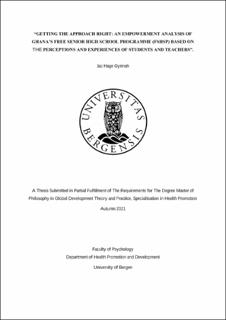| dc.description.abstract | Accessibility inequalities in formal education is still a growing worldwide concern and of high relevance, as it is known to make a far-reaching contribution to development. Accordingly, global educational reformers are resolved to provide formal educational frameworks through all-inclusive (free) educational empowerment policies or programmes that aim to bridge the educational accessibility gaps within and among developing countries, especially in Africa. Ghana has synchronously introduced several free primary and secondary education programmes to eradicate its non-inclusive educational environment over the past two decades despite most African countries' inability to ensure mass educational participation. Notable among them include the Free Compulsory Universal Basic Education in 1994, Progressive Free Senior High School Programme/Policy in 2015 and the Free Senior High School Programme/Policy in 2017. Undoubtedly, the introduction of these free education initiatives has instigated an exponential increase in student enrolment, both at the primary and senior high/secondary levels. However, the expected empowerment impacts of these programmes are seemingly unconvincing, given their objectives and approaches. It is believed that the efficacy of such programmes is contingent on the underpinning frameworks and approaches to their implementation. Although there have been many empirical free education studies within the Ghanaian context, particularly on the free senior high school programme, there seems to be little evidence on the relationship between the implementation structure (approach and framework) and its impact on the quality of education (empowerment). By addressing the literature gap, this study aims to explore how the initial roll-out of Ghana's free senior high school policy/programme has empowered participating students. From a health promotion perspective, the study also aims to examine the well-being of students and teachers, as good health is deemed an integral part of empowerment. The study adopts the qualitative approach in investigating the research phenomenon. It employs three qualitative data collection methods: in-depth online individual interviews (two participants), written responses to open-ended questions (18 participants), and documentary data (a document from the ministry of education). In addition, the study complementarily employs two theories, the theories of empowerment and Salutogenesis, for theoretical analysis of the study's findings. First, in unravelling how participants perceived and understood the programme, the study findings reveal participants exuding great understanding of the programme. Second, the findings also project the prevalence of several implementation challenges that affect empowerment: poor learning and living conditions, poor attitude of teachers (students' perceptions), increased enrolment related stress, economic-related stress, and other challenges (teachers' perceptions). Other findings also include two different levels of coping strategies (individual and institutional levels) employed by participants to mitigate empowerment challenges; a nearly split perception of the quality of tuition offered and the level of knowledge, skills, and competencies gained under the free secondary programme. Finally, the findings also somewhat project self-dependency as being crucial for student empowerment. Based on the findings, the study concludes by recommending a revision of the existing pedagogy and its pedagogical practices, improving the living and learning resources to help end the double-track system, and making the free senior high school programme health-promoting. | |
